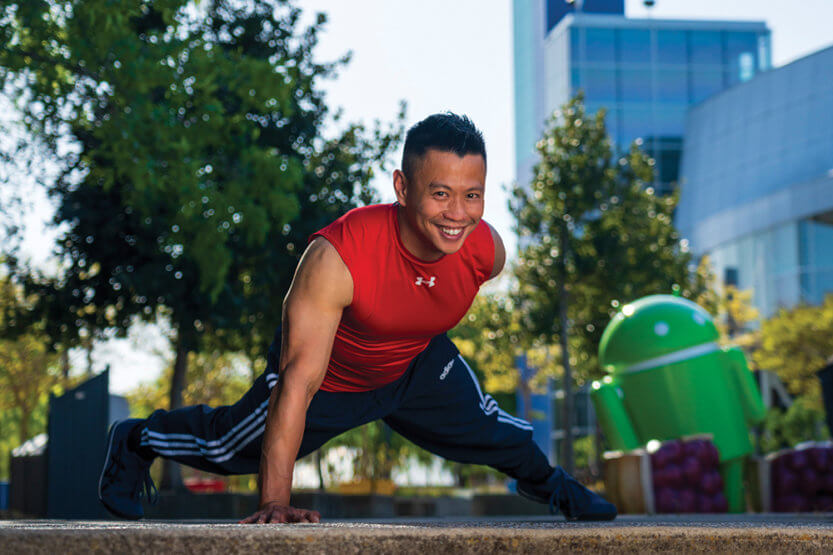Alumni Interview: Newton Cheng
 “Our mission and vision [are] to create a culture of well-being that inspires people around the world to take care of themselves and each other,” says Newton Cheng, ’01 ENG, director of global health and performance at Google. (Image by John Devon)
“Our mission and vision [are] to create a culture of well-being that inspires people around the world to take care of themselves and each other,” says Newton Cheng, ’01 ENG, director of global health and performance at Google. (Image by John Devon) I believe in the power of health and well-being. Corporations have a special opportunity because healthier employees make the business more successful. I believe if we help people at Google, other companies may follow, improving lives around the world.
That’s what I told Google during my interview for the fitness operations manager. They said, “That’s exactly what we want you to work on.” I’m still here 12-and-a-half years later.
I grew up in Macomb, Ill. My parents were both doctors—general practitioners. In the local grocery store, people would say, “Hey, you’re Dr. Cheng’s kid. Your dad, or your mom, took great care of my mom. Thank you.” I realized then, if you find the right way to contribute, you can make people’s lives better.
Sometime around junior high, I heard a kid boasting about doing 40 pushups. That blew my mind; I could only do three. I wondered what would happen if I did pushups while watching Saturday-morning cartoons. After a few weeks, I could do 40 pushups. Soon after, my brother and I started lifting weights at the YMCA. As you develop muscles, your self-identity changes. I went from “I’m one of the weaker kids” to “I think I’m stronger than a lot of other people.”
I also was good at math and science. My two oldest sisters went into engineering at Illinois, so I followed. It wasn’t easy, and I lacked the passion some of my peers had. But I stuck with it. That also built self-belief.
I graduated and got a job working as an engineer in Silicon Valley. But like many 23-year-olds, I wanted to better align my work with my passions. I talked my way into getting an internship in personal training, got my certification, and started at the studio across the street from my office. I would train clients from 6 a.m. to 9 a.m., do engineering during the day, and train more or teach breakdance classes at night. I loved it, but the pace wasn’t sustainable.
I talked my way into getting an internship in personal training, got my certification, and started at the studio across the street from my office. I would train clients from 6 a.m. to 9 a.m., do engineering during the day, and train more or teach breakdance classes at night. I loved it, but the pace wasn’t sustainable.
When a school teacher paid the studio’s high rates to train with me despite his low salary, I couldn’t help but think something was broken. Despite his important work, he could barely afford support for a healthy lifestyle. That was not an exercise science problem; that was a business problem.
So I decided to get my MBA at the University of California, Berkeley. I focused on corporate fitness, health and well-being. There’s an alignment of incentives. Employers want their employees to be healthier, happier and more productive. Meanwhile, employees want a better quality of life.
I came straight to Google from grad school. Initially, we had a few people supporting fitness programs. Now, we’re a small company within a company. Our team supports a global portfolio of fitness centers and massage rooms, along with offerings such as resilience programs and gPause, Googler-led meditation communities.
During the pandemic, we pivoted quickly. Once it became clear we’d have to send everyone home, it was mind-boggling. This was not taught in my classes at U of I or business school.
I reflected on our mission and vision: to create a culture of well-being that inspires people around the world to take care of themselves and each other. That didn’t change. So if we couldn’t reach people with physical spaces and services, we’d have to address their new challenges.
We continue to run digital classes spanning different types and times every week. One of our most popular was kids’ story time. You could enjoy it as a family or have your kids interacting with the reader and other kids, so you got a few quiet minutes.
We also had huge events—a 5,000-participant virtual 5K and a global talent show. There were dancers from Japan, piano players, singers, people doing magic tricks. The Google community showed that even from our homes, we’re still connected and vibrant.
Alongside all this, I’ve kept pushing, personally. I got into powerlifting in my 30s. By the time I hit 40, I was national champion and won a bronze medal in the World Classic Powerlifting Championships. Someday, I’d like to break the world deadlift record. I’m doing this to stay in shape, but also for the process of mastery and achievement. They’re intertwined—and integral to my own health and well-being.

